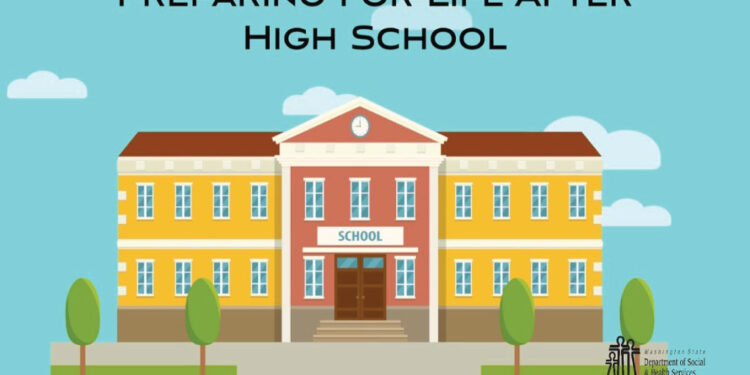1.0. Introduction
Post secondary education is life after secondary school. It terminates on one entering into the tertiary institution. For those who may not have the opportunity and privilege of being in the high institution, post secondary era is simply the life after secondary school. Some argue that even life in the tertiary education is still post secondary until the graduation of the student. This paper does not intend to extend this logic too far.
In as much as primary education is the basic education, secondary education is the functional education. It provides the necessary education to fit into society. Those lacking this functional education fill the vacuum in their lives.
The age category on leaving secondary education is usually from middle teens to early 20s. This age category has certain characteristics such as desire for adventure, stamina, strong libido, high risk-taking, sensuous pleasure, aggression, etc. These characteristics influence the conduct of their lives which help in exacerbating their challenges.
This influence is complicated by the socio-economic situation of the nation. Rarely are post secondary school leavers in Nigeria, unlike in advanced societies, exposed to regular camp life for leadership training, sports, moral instructions, recreation, friendship, orientation, etc. Life after secondary education in Nigeria for youths is a life that is more susceptible to such influences as drug addiction, armed robbery, prostitution, stealing by false Pretenses (419), gangsters, etc. It is life where some secondary school leavers become vulnerable to drug and child traffickers as couriers and victims respectively.
Furthermore, the economic situation in Nigeria today is not helping out. Many parents have lost their jobs as a result of the closure of some companies and industries or the retrenchment of staff, owing to the economic crunch. Inflation is not only creeping; it is galloping. In this scenario, parents and guardians rarely support the school leavers financially, rather resources are channeled to bringing up their young ones. The average school leaver, in the absence of means of sustenance, is faced with temptation to engage in vices and some do.
To worsen matters, the ostentatious life of some politicians, drug barons,’419ners’,etc, with the display of their filthy lucre, undermines the values of many school leavers. Life is seen by them from the fast lane; hard work, patience and growth in an endeavour are no longer cherished ideals.
These are just a tip of the iceberg. We will examine the challenges and ways of dealing with them.
2.0. Post secondary challenges and ways of dealing with them
There are many challenges to a secondary school leaver. For the purpose of this paper, we shall deal with lack of orientation to fit into the larger society, problems of choosing a career, admission difficulty/ lack of orientation for higher studies, employment difficulties, idleness and peer group influences.
2.1. Lack of orientation to fit into larger society
Secondary education offers one a training on discipline in punctuality, regularity of attendance, cleanliness, table manners, handling brushes among people, etc. These should be retained, as you enter the larger society. There are a lot that you should not bring into the society. They are petty stealing which you call ‘tapping’; ‘lesbianism’ which you call ‘supe’, trespassing on lawns which you call ‘appiam way’; lying which you call ‘rapping’; selling your valuable things at any instance you are broke which you call ‘racking’; and so on. Some of these things which you call little things can put you in trouble or embarrass you.
You must imbibe, as earlier mentioned, values of hard work, patience and appropriate growth in your chosen endeavour. The consequences of not doing it may not be palatable to you. You should be humble and learn to respect your seniors in age or career, and the authorities. These attributes; humility, honesty and servility will catapult you into higher heights in society. It is my suggestion that secondary schools should organize regular seminars for their students and invite motivational resource persons to speak to them on how to succeed in life. This will provide orientation for the school leavers to fit well into the larger society-
2.2. Problems of choosing careers
One of the problems affecting secondary school leavers is the choice of career. While in the school, the students are influenced by the choice of their peers, parents, teachers, etc. On leaving school, they are faced with the stark reality of their choices. The choice of career becomes determined by the present or future job prospects, interest, talent, cost of training, level of intelligence, professionalism,qualification, duration of training, tedium of training and career, etc. Choosing a career is better done while in secondary school. This helps the student to work for his or her qualification. After school presents to the student the difficulty of re-doing exams or leaving ones career to chance, Secondary institutions should have the services of experts in guidance and counselling, if not in their employ, on consult basis in order to help students in senior secondary schools to choose their careers.
2.3. Admission difficulties and lack of orientation on life in the tertiary institution
For secondary school leavers who intend to pursue higher studies, their main problem is how to secure admissions into higher institutions. The problem begins with the qualifications for the course of the candidates’ choice. The universities require five credit passes in five subjects in one or two sittings of either WAEC or NECO. Some universities do not accept combination of the two bodies. Every course has its subjects for qualification. For polytechnics/monotechnics and colleges of education, theirs are four credits in four subjects in one or two sittings of either WAEC or NECO. A candidate without appropriate qualification should not talk about admission. It is preferable, if a student settles the issue of qualification while in school. After school poses its own problem.
For admission, particularly that of the universities, a candidate is expected to pass JAMB and aptitude test. For JAMB, he is expected to score at least 180 which qualifies him for the aptitude test of the university of his first or second choice. The two scores are combined to give the average score of the candidate. Scores for gaining admission vary from course to course and are dependent on the scores of competing candidates.
Admission is grouped into merit, catchments states, educationally disadvantaged states and the university discretion. And so, scores for admission vary even in a course. It is important a candidate knows his or her catchments universities or polytechnics/colleges of education before making a choice.
Being in the university poses its challenges. The student should carefully select his friends. The type of friends he or she chooses will determine whether he or she will graduate, be a cultists, prostitute, etc. He or she should also know his or her right by reading the university handbook, to avoid victimization of any kind and access to facilities he or she is entitled to. You should also know the type of associations to belong on campus, considering your family background and desire to graduate in flying colours.
2.4. Employment Difficulty
While some secondary school leavers opt for higher education, some with financial challenges may settle for employment or vocational skills. Getting a job at this level is difficult. You should make your self employable by acquiring basic skills such as computer knowledge, driving , book keeping, etc, in addition to your senior secondary school certificate.
For those wishing to acquire vocational skills, they should look out for the ones that ensure self reliance, high prospect for employment, customer attracting and so on. You should also consider how expensive the tools are and the cost of opening a shop viz-a-viz your finance. There is nothing wrong if one tries the banks with good feasibility study.
2.5 Idleness
To some school leavers, particularly those aspiring to go for further studies; the life after school is a life of endless waiting and idleness. It goes with over-feeding, excessive watching of movies, travelling and, of course, being a devil’s workshop. It is pertinent to state that movies and indeed other mass media can in some circumstances be of bad influence to school leavers.
This idleness ought not to be. It should be a period school leavers should occupy themselves with training in computer or one skill or the other. No knowledge is a waste. They should occupy themselves with reading, writing, and other creativity.
2.6. Peer group influence
Peer group influence is stronger after secondary education than during secondary education. The reason is that lesson and homework reduce level of interaction among peers. The level of interaction increases at post secondary era, particularly at the idle period. That is the transition from secondary education to the tertiary. The level of interaction is higher if the parents or guardians are career ones with nobody to look after them.
Bad peers could exert strong negative influence on the school leavers such that they indulge in vices as smoking, sleeping out, engaging in street fights, clubbing, hooking, etc. But good peers could arouse interest in further studies, increase academic abilities, change negative behaviour and instill healthy rivalry.
Parents or guardians should be mindful of the type of peer influence on their children or wards and proper restriction placed on such bad peers.
3.0 Conclusion
Post secondary era is a delicate period in the lives of youths. It requires the effort of parents/guardians,government, non-governmental organizations, alma-maters to herd them into being responsible, hopeful and prospective citizens. Their alma-maters should play a role by opening a unit responsible for relating with old boys and girls-.The unit should call or text them from time to time to know how they are faring . It should invite them for a home-coming to their alma-mater to promote the relationship. Those who are not doing well among the should be encouraged while those who are doing well should be urged to keep it up. In so doing, the alma-maters will be contributing to surmounting the challenges of post secondary education.
Government and non-governmental organizations should organize camps to mould, motivate and inculcate into secondary school leavers virtues of leadership, morality, discipline and hard work. This will go a long way in raising a generation of Nigerians that will make a difference in our national life.
References
Alexander, M.C.(2002, summer).The first amendment and problems of political viability:The case of internet pornography. Harvard Journal of Law & public policy, 25,977-1030. Retrieved july 24, 2002 from EBSCOhost,
Finders, M.J.(1996). Queen and teens zines: Early adolescent females reading their way toward adulthood. Anthropology and Education Quarterly, 27,71-89.
Greenberg, B.S., linsangan, R., Soderman, A., Heeter, C.,lin,C.,Stanley,C.,etal.(1993). Adolescents’ exposure to television and sex movie.
Niebuhr, R.(1996), Moral man and immoral society: A study in ethics and politics. New York: Scribner.
Walsh, D.(1994), Selling out America’s children. Minneapolis, MN: Deaconess



















